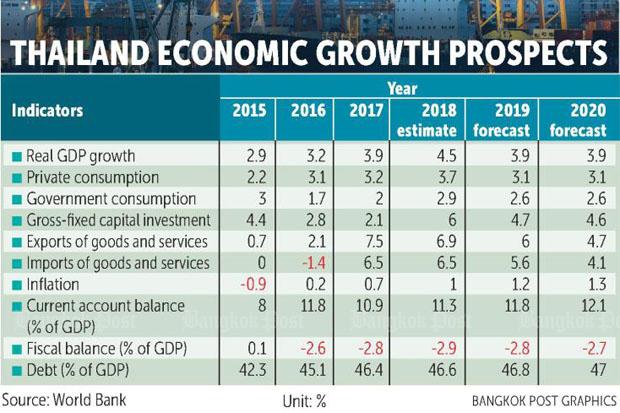Thailand: World Bank predicts GDP ebb
Despite an improved forecast for this year’s economic growth, Thailand’s outlook over the next two years is projected to slow down as investment is poised to subside and external uncertainties cast a shadow over exports, says the World Bank.
The World Bank has upgraded Thailand’s economic growth forecast to 4.5% from 4.1% this year based on domestic demand recovery and a boost in public investment activities through execution of large infrastructure projects and spending by state-owned enterprises.
The World Bank’s economic growth projection for Thailand in 2018 is similar to the Bank of Thailand’s 4.4% forecast, but the former’s estimate of growth in 2019 is lower than the central bank’s 4.2% projection.
Thailand’s 4.5% growth estimate is the lowest among developing Asean countries, where economic growth is anticipated to be 4.9-7% this year.
The National Economic and Social Development Board in August reported economic growth of 4.6% year-on-year for the three months to June and 4.8% year-on-year for the first half.
But economic growth momentum is projected to slow to 3.9% in 2019 and 2020 as stronger domestic demand is expected to partially offset moderated net exports, according to the World Bank’s latest edition of the East Asia and Pacific Economic Update titled “Navigating Uncertainty”.
“Thailand’s GDP growth over the next couple of years is expected to slow down from this year’s growth projection as the latter growth momentum is a result of infrastructure investment projects postponed from last year,” said Kiatipong Ariyapruchya, senior country economist.
“We expect investment will return to a normal level over the next two years, while exports [of goods and services] are expected to be dampened by external uncertainties.”
Gross fixed capital investment is projected to expand by 4.7% in 2019 and 4.6% in 2020, down from 6% estimated this year.
Exports are expected to fall to 6% and 4.7% in 2019 and 2020, respectively, considered a decline from 6.9% estimated in 2018.
For the medium term, Thailand should place emphasis on investments in infrastructure and human capital along with improving education to enhance income among Thais and break out of the middle-income trap, said Sudhir Shetty, chief economist for the East Asia and Pacific region.
Increased protectionism as well as slowing growth in Thailand’s key trading partners may diminish export growth and slow private investment recovery, according to the World Bank.
Recent trade indicators in June and July already showed a softening in merchandise trade.
A second key risk is delayed private investment recovery, given concerns over domestic political uncertainty, said the World Bank.
“Private investment sentiment improved notably in this year’s second half but in general has been weak since 2012. Private investors remain concerned about political uncertainty and the adverse impact on planned public infrastructure projects and policy continuity,” said the report.
Source: https://www.bangkokpost.com/business/news/1552250/world-bank-predicts-gdp-ebb


 English
English




